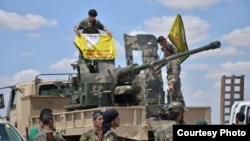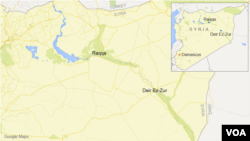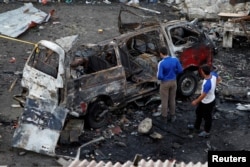Syrian Kurdish commanders are working to contain an Islamic State onslaught of suicide bombings and commando-style raids - two of the jihadist group's favorite tactics when it is about launch counter-offensives in Syria or Iraq, or when it is losing ground to its foes.
Islamic State time and again has exploited its fighters' mobility, including switching from one side of the Syrian-Iraq border to the other, launching attacks where they are least expected and using suicide bombers and lightening raids behind enemy lines to wrong-foot opponents.
That was demonstrated a year ago when the resilient group launched an unanticipated counterpunch, stunning the governments in Washington, Baghdad and Damascus by retaking the Iraqi town of Ramadi in the face of much superior numbers while at the same time, 95 kilometers away, seizing Syria’s Palmyra, the desert town containing one of the world’s most important Roman heritage sites, from government forces.
Such dramatic displays of battlefield capability are probably beyond IS now, say analysts.
Fewer big strikes by IS
The group’s ability to move large numbers of forces has been sharply reduced because of U.S. and Russian ‘eyes-in-the-sky' - aerial surveillance puts the extremists' convoys at risk of airstrikes. And IS is facing upgraded forces, especially when it comes to the Syrian government. Rebel commanders say most of the pro-regime battle force is not the Syrian army, but Iranian revolutionary guardsmen, fighters from Lebanon’s radical Shi’ite movement Hezbollah and Syrian militias trained by Iran.
But the better organized and more confident forces challenging IS remain vulnerable to the kind of hit-and-run attacks that took the U.S. army years to contain in Iraq after the ouster of Saddam Hussein. U.S. military officials speaking off the record also acknowledge that aerial surveillance is not fully effective in detecting the movement of lighter and smaller IS units.
Kurdish commanders in the Syrian Democratic Forces, the YPG-dominated anti-IS alliance, want to limit the offensive they announced this week and stop short of the city of Raqqa, the self-declared IS capital. The U.S. military observers say this is partly due to their reluctance to expose their forces to hit-and-run IS attackers.
WATCH: US-backed Rebels Advance Toward Raqqa
“The YPG is very cautious in its military actions in northern Raqqa, especially after the multiple security and military breaches carried out recently by IS,” said Hamoud Almousa, an activist with the anti-IS network Raqqa is Being Slaughter Silently.
Kurds vulnerable to suicide bombings
This week’s seven near-simultaneous IS bombings in Latakia, the Syrian government's heartland, illustrate the dangers the Kurds face. More than 180 people were killed by five suicide attackers and two car bombs targeting civilians; one IS bomber blew himself up in a hospital emergency room, finishing off others who had survived their initial wounds.
Such attacks serve several purposes: They boost morale among IS fighters, giving them a sense the group remains undefeated despite losses. They provide a psychological-warfare edge by eroding their foes' confidence. They force IS enemies to divert forces for self-defense rather than offense. And they inflame sectarian hatreds.
Seven Sunni Muslims, all of whom had been displaced from their home villages, were killed in northwestern Syria by local Alawites in retaliation for the bombings. Alawis are members of the same Muslim sect, a Shi'ite offshoot, as President Bashir al-Assad.
According to anti-IS activist Almousa, the Kurds' YPG forces have erected dozens of checkpoints to try to hold back the bombers. “ISIS strategy does not rely too much on defense; they focus on counter-attack and sudden breakthrough. This strategy makes the YPG worry a lot more about their front lines and has made them reconsider any military action in any area that has no Kurdish majority population,” he says.
Not that all will be counterattack. While the group’s chief defensive tactics is to counterpunch, it has also in recent weeks increased the number of its fighters in villages around the city of Raqqa, dug trenches, sown minefields and planted booby-trap bombs in villages it expects to lose — all of which will slow up any offensive forces.

















